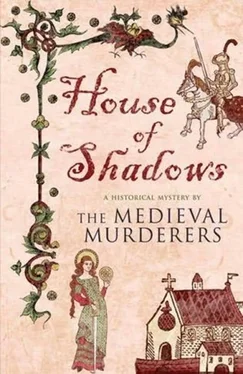The prior rapped his table with his fingertips. ‘Then tragic death seems to run in the Glanville family, for two days before the wedding his great-niece was found dead in one of our cellars!’
‘Why was she a royal ward, prior?’ asked de Wolfe.
‘When she was a child, her mother died giving birth to a son, who would have been the heir except that the infant died as well. Christina was the only child of Sir William de Glanville – and to complete the tragic circle, he also died alongside his uncle while fighting the Mohammedans at Acre.’
‘Is the Glanville family not from Suffolk, sir?’ ventured Thomas from across the room.
Robert Northam nodded. ‘They are indeed – and the girl’s father left a very substantial estate there, as well as other property elsewhere. As there was no heir of the age of majority, it all escheated to the Crown on his death and his only surviving child was made a ward of King Richard.’
‘But presumably she was placed in the care of a guardian, unless she was sequestrated in some other religious house?’ suggested the coroner.
‘Indeed she was, Sir John. At first she was placed in the Gilbertine convent of Sempringham in Lincolnshire, being only ten years of age at the time of her father’s death. Then her uncle, her late mother’s brother, arranged for her to live with his family as a more congenial home for a young girl.’
‘Wasn’t that a long way from her own estates in Suffolk?’ asked John.
‘Her father had had several manors and mines in the shire of Derby as well,’ replied the prior.
Brother Ignatius diffidently murmured further details from alongside his superior’s chair. ‘The lands of Sir Roger Beaumont lay adjacent to the Glanville manors in Derbyshire, so it was convenient for him also to be appointed administrator of the escheated estate. The king agreed and Chancery drew up the deeds.’
De Wolfe, cynical fellow that he was, felt the first twitchings of suspicion when he heard this. ‘No doubt there was some financial advantage for him in this arrangement?’
The prior took up the tale again. ‘Roger Beaumont took half the income from the Glanville properties, the remainder going to the Exchequer on behalf of the king. It was reasoned that this was his due for sheltering Christina and the labour of running the very extensive estates, which were scattered over three counties.’
John suspected that the labour involved would have been deputed to a bevy of bailiffs and reeves and that Roger would need to do little other than to sit back and rake in the profits from the farming of sheep and cattle. If Derbyshire was included, quite probably there would be lead-mining and quarrying as well.
Thomas was wriggling a little on his bench, as his quick mind was looking further ahead. ‘Prior, what would have occurred when this young lady reached maturity?’
Northam looked across at the little priest with interest. He had already formed the opinion that here was a sharp fellow and this last question confirmed his view.
‘This is where motive rears its ugly head, I suppose. Whether Christina married or not, she would have recovered the ownership of her estates on reaching sixteen.’
Robert poured some wine for them before continuing.
‘Her father’s last will and testament plainly stated that when she came of age, she was to inherit the whole estate. The Curia Regis would no doubt have found a reliable steward to run the lands for her, though legally she would have been entitled to do what she wished with them. Of course, the king could have disregarded this and kept them for himself, but as both Glanville and his illustrious uncle had died fighting alongside the Lionheart at Acre, it would have been an unpopular act.’
De Wolfe thought that the prior was going to say ‘churlish act’, but he avoided this potentially seditious remark in time. Instead, John’s bushy black eyebrows rose a little as he questioned the priest again.
‘Sixteen? But she was about to be wed, so when would she have reached that age?’
Robert Northam sighed again, his worried features telling of the stressful time he had recently endured. ‘She was to be married at St Paul’s on her sixteenth birthday, coroner. And that would have been the day after she was found dead!’
There was a silence as the three visitors digested the significance of this news ‘Might we ask to whom she was betrothed?’ asked Thomas tentatively.
‘A young man called Jordan de Neville, again from a well-known family. He was about five years older than the girl, the third son of the Nevilles, a rising family from the north country – Durham, I believe. The match was sponsored by several members of the Curia Regis and Hubert Walter was himself keen on the union, at the direct behest of the king, so I understand. King Richard, in a rare burst of interest in English affairs, decided that Jordan de Neville would make Christina an ideal husband and incidentally bring his manors as a useful addition to the Glanville lands. There must have been some covert petitioning going on in Rouen that I was not aware of.’
‘And who inherits, now that she is dead?’ asked John bluntly.
The prior shrugged, holding his hands palm upwards, after the fashion he acquired in France. ‘It is not settled – but unless the king steps in to take the lot, Roger Beaumont has the best claim. He was Christina’s guardian and nearest relative, and has been administering the estate successfully for six years.’
Again the coroner’s index of cynicism rose another notch. A political marriage, drafted by the machinations of the court. He wondered what the prospective bride and groom thought of being pushed together by external pressures – the fact that it had happened to him sixteen years ago made his doubts all the stronger. Still, that aspect was none of his business and he returned to the duty that had brought him to Bermondsey.
‘I need to know something of the background of the people who were with the girl before she died. What possible motives can there be for her murder, for she was not yet sixteen?’
‘Many a child younger than she has been killed for less than is at stake in her case,’ answered Robert sadly. John downed the last of his wine and looked quizzically across at the prior.
‘So who could gain what from killing the poor girl?’ he demanded.
Robert Northam shrugged. ‘The obvious choice is Roger Beaumont. He had been sitting on a very handsome income for six years and had dug himself well into the administration of the Glanville lands. Now it would all be whipped away from him on the day of her marriage.’
‘Would her death make that much difference?’ asked de Wolfe. ‘The estates were not his, whatever happened.’
The prior gave a cynical chuckle. ‘Possession is a very potent persuader in the eyes of the law – and of King Richard. Much as we both admire and loyally serve him, we must admit that he has a great attraction for money. He said not long ago that he would sell London itself if he could find a rich enough buyer! With no heir apparent after the girl died, Roger Beaumont no doubt could expect to be offered her escheated estates at a bargain price, after looking after them for half a dozen years.’
De Wolfe nodded his understanding and got down to more immediate issues.
‘So how did the poor girl die, prior? What is it that requires the attentions of a coroner?’
Robert Northam took a deep breath and used his arms to brace himself against his table. John had the feeling that his preamble so far had been partly to delay having to recount the more distressing events.
‘On Tuesday morning of last week, one of the obidentiaries who assists the cellarer had occasion to visit the vault beneath the cellarer’s building in order to make an inventory of some goods or other. This was a frequent task, often undertaken daily. When this brother descended the stairs, he was shocked to find the body of a woman lying at their foot. He raised the alarm by seeking out the cellarer, Brother Daniel, who with several other monks and lay brothers rushed down to the crypt. The infirmarian was called, as he was most skilled in physic, but he found that she had been dead for some time.’
Читать дальше












